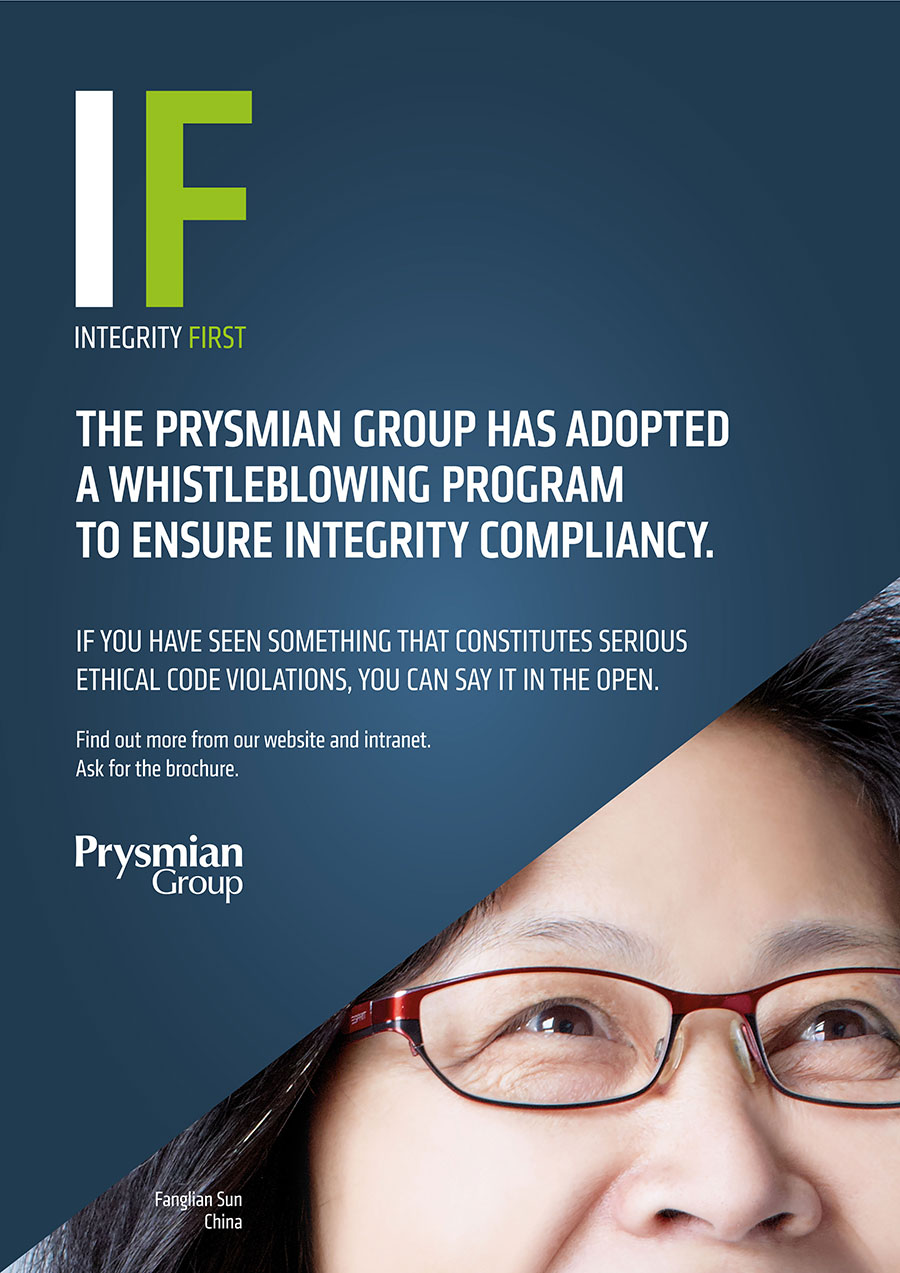The new compliance approach
of Prysmian Group
Focus On
The new compliance approach of Prysmian Group

Alessandro Nespoli, Chief Compliance Officer at Prysmian, explains in an interview with INSIGHT why the value of integrity goes well beyond the simple observance of rules and regulations, and in fact, permeates the entire spectrum of company life.
when it comes to ethics, no challenge is too big, or too small, if it means doing things right. This is what I’ve always stood for, and this is exactly what Prysmian intends for its integrity initiatives”. With an attitude that perfectly matches the company, one would be forgiven for thinking that Alessandro Nespoli has always been at Prysmian, but in fact he only recently joined the Group from Luxottica, as Chief Compliance and Internal Audit Officer.
“When I joined”, Alessandro recalls, “I began to discover the company by starting with its values: excellence, integrity and understanding. And I decided to focus on integrity, to try to integrate the concept into tangible examples and a cultural approach”.
To translate this value into real action, the Group launched the Integrity First project at the end of last year. Alessandro notes that “Integrity is an ever-present concept”, but he adds that until now it has only really been referred to in the Group’s whistleblowing programme – the effective tool created for identifying fraud and misconduct. “Now we intend to expand it by developing and sharing a new compliance ecosystem”, he says. According to Nespoli this ecosystem will cover a series of issues and actual behaviours “that shall ultimately become part of the DNA of Prysmian Group’s people”.
Alessandro explains, “Ethics influence our way of working and making decisions, while having an impact on our stakeholders and customers”. As it affects reputation, “it is the most important asset we must preserve. If customers trust us, they will do business with us”. The new compliance ecosystem will oversee different issues and set forth even those behaviours that are not strictly compliance-related. As Alessandro stresses, “This culture of integrity is reinforced by our company’s Code of Ethics, based on three pillars: ethics in business activities, ethics in internal relations, and ethics in environmental and social matters”. It means that ethics “is pervasive and regards everyone within and outside the organisation”.
Nespoli also discussed how to enact the change, pointing out the “need to become the role models for compliance issues” within the organisation, and for “showing consistency between words and actions”. Alessandro believes that “compliance is key to Prysmian Group, and local managers are the primary compliance owners; they act as mouthpieces and are an example when it comes to integrity”. But, he adds, “we are also champions, because we promote and spread the company’s Code of Ethics through our daily actions”. By creating a strong compliance culture, the company will be able to adapt to new legislation more quickly, allowing it to better pursue its business goals.
Complying with regulatory requirements is mandatory, time consuming and complex, but time can be optimised and resources more adequately allocated to develop a stronger system, turning the whole process into an opportunity that gives the company a competitive advantage.
“This means”, Alessandro notes, “that we will become more agile in responding to new regulatory changes; remain one step ahead of our competitors; build awareness around our own compliance culture to help strengthen our reputation; reduce penalties and fines imposed by authorities, and instill confidence in our people, our partners, and all our stakeholders”.

We are also champions, because we promote and spread the company’s Code of Ethics through our daily actions”.
According to Alessandro, “Promoting compliant and ethical conduct and behaviour will positively influence our business: the purpose is to further strengthen our ethical DNA, involving everybody in a shared control system”. In his view this is not just an economic issue; it concerns the company’s most valuable asset – its reputation. Preserving it is in the interest of each and every person, and of the company as a whole. “Compliance is an ‘all-together’ job”, Alessandro stated.
SHARING AND SPREADING THE ETHICS DNA
The Compliance arm of Prysmian, in co-operation with SDA Bocconi and the Group Academy, launched the Integrity First professional training programme in July 2017, with a focus on anti-bribery and anti-trust issues. Over the six planned editions, training involves around 200 sales managers from different corporate regions.
The Digital Academy with online courses focused on anti-bribery and anti-trust issues for Italian affiliated companies, has been recently launched.
Among the topics of the next courses, close attention will be paid to the issue of data protection, as on May 2018 the European Union’s General Data Protection Regulation (GDPR) comes into effect.
According to professor Markus Venzin of SDA Bocconi, the participants of the programme will act as change agents – Integrity First will help them to understand and embrace the need for high ethical standards in connection to Group strategy, which is a prerequisite for an effective change process. Digital training for all sales people will also be launched on the same topics.
The ultimate goal is to make people distinguish legal from ethical issues and, while considering country differences in legal frameworks, have all Prysmian people following a universal ethical code of conduct, all around the globe.
